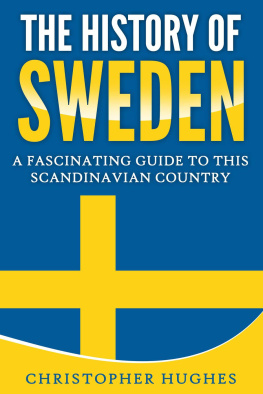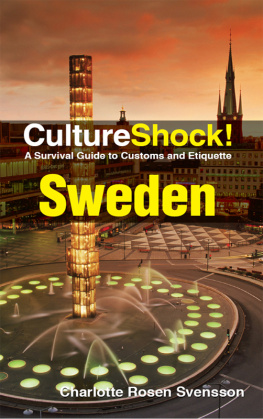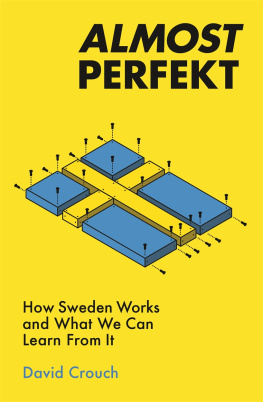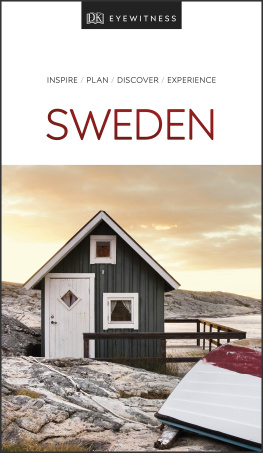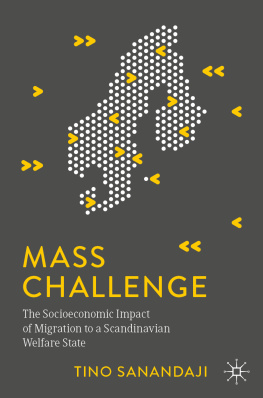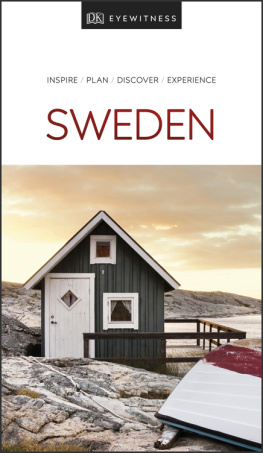Pelle Neroth Taylor - What did you do in the War, Sweden?: The roots of tolerance for mass immigration in Sweden’s experiences of the Second World War
Here you can read online Pelle Neroth Taylor - What did you do in the War, Sweden?: The roots of tolerance for mass immigration in Sweden’s experiences of the Second World War full text of the book (entire story) in english for free. Download pdf and epub, get meaning, cover and reviews about this ebook. year: 2015, genre: History. Description of the work, (preface) as well as reviews are available. Best literature library LitArk.com created for fans of good reading and offers a wide selection of genres:
Romance novel
Science fiction
Adventure
Detective
Science
History
Home and family
Prose
Art
Politics
Computer
Non-fiction
Religion
Business
Children
Humor
Choose a favorite category and find really read worthwhile books. Enjoy immersion in the world of imagination, feel the emotions of the characters or learn something new for yourself, make an fascinating discovery.

- Book:What did you do in the War, Sweden?: The roots of tolerance for mass immigration in Sweden’s experiences of the Second World War
- Author:
- Genre:
- Year:2015
- Rating:4 / 5
- Favourites:Add to favourites
- Your mark:
- 80
- 1
- 2
- 3
- 4
- 5
What did you do in the War, Sweden?: The roots of tolerance for mass immigration in Sweden’s experiences of the Second World War: summary, description and annotation
We offer to read an annotation, description, summary or preface (depends on what the author of the book "What did you do in the War, Sweden?: The roots of tolerance for mass immigration in Sweden’s experiences of the Second World War" wrote himself). If you haven't found the necessary information about the book — write in the comments, we will try to find it.
Pelle Neroth Taylor: author's other books
Who wrote What did you do in the War, Sweden?: The roots of tolerance for mass immigration in Sweden’s experiences of the Second World War? Find out the surname, the name of the author of the book and a list of all author's works by series.
What did you do in the War, Sweden?: The roots of tolerance for mass immigration in Sweden’s experiences of the Second World War — read online for free the complete book (whole text) full work
Below is the text of the book, divided by pages. System saving the place of the last page read, allows you to conveniently read the book "What did you do in the War, Sweden?: The roots of tolerance for mass immigration in Sweden’s experiences of the Second World War" online for free, without having to search again every time where you left off. Put a bookmark, and you can go to the page where you finished reading at any time.
Font size:
Interval:
Bookmark:
WHAT DID YOU DO IN THE WAR, SWEDEN?
Why should the Swedish army be allowed to clean up Norway? It would be better if the Allied armies cleaned up Sweden. - Winston Churchill, 1945
Sweden sees itself today as the world's moral conscience. The country took in more asylum seekers in 2013 than any other European country, in absolute numbers. In 2014 it was number two in absolute numbers (after Germany) but number one per capita. Sweden is granting automatic residence permits to all Syrians arriving from the civil war there. After the Iraq war, one town in Sweden, Sdertlje, took in more refugees from the conflict than the entire United States, the country that was, after all, the instigator of the war.
Why does Sweden continue to be so uniquely generous, more so than any of its Scandinavian neighbours? The country's generous policies are not cheap, and occur at a time of general retrenchment in the welfare state: cuts to pensions and growing unemployment among native Swedish youths. Polls show that social trust, the ingredient X of Swedish prosperity, is declining, especially among the young. The newspapers are filled with stories of shootings by criminal gangs from the Balkans and of recent immigrants using various corrupt schemes to cheat the welfare state out of benefits.
I think there is a deeply rooted myth that sits at the heart of the modern Swedish identity which makes them hard to do otherwise. There is a sense of humanitarian generosity, mingled with not a little well-meaning superiority, which has its roots in the 1960s and 1970s era immediately after Sweden's great leap of prosperity after the Second World War. Olof Palme, then a minister and media figure, later prime minister, sometimes called Scandinavia's Kennedy, helped fashion a powerful self-image and identity for Sweden that drew on his own roots in the old aristocracy cosmopolitan, imperialist and applied it to the humanistic solidarity of the Social Democrat movement, which itself had its roots in the 19 th century Christian influenced Free Church movement. Palme grew up a conservative, in a family obsessed with the reconquest of Finland - once a Swedish province - from the dastardly Russians.
Palme understood that dreams of military glory were no longer possible for a small country squeezed between two superpower blocs fighting a cold war. They were not feasible anyway in a modern world where public opinion had made violence unacceptable. But he understood how nationalism could be both a source of solidarity, pride and motivation that these sentiments could be harnessed on behalf of the left and on behalf of his beloved Social Democracy.
He fused nationalism with the pacific impulses of the Social Democrat party he had joined in his twenties and quickly progressed up the career ladder in. So what you got was a kind of pacifist and humanitarian imperialism, and nationalism in the form of an almost French concept of civilisation lumiere . Sweden was going to be a model for the whole world. Sweden was fortunate that there was a place in the global political marketplace for a prosperous country to provide a beacon for the newly decolonised and often socialist countries of Asia, Africa and Latin America.
Perhaps there was also the sense that, while the UK and US the countries from which Sweden took its impulses, now the Germany had destroyed its reputation had had a good war, an event that provided foundational myths for America's post war hegemony in the one case, to legitimise the construction of the welfare state in the other Sweden had had a less noble war. Sweden had offered a bit of humanitarianism, like letting in Denmark's 7,000 Jews in daring night time escapade across the Oresund straits. But also a lot of compromises, grubby concessions, grovelling to power, and rank opportunism. Sweden's post-war prosperity was not only built on the fact it was one of the last men standing, having had let others fight for democracy. But also because its prosperity had grown considerably during the war through profitable exports to Nazi Germany, all of which had allowed its industry to develop. Undestroyed by war, this infrastructure gave Sweden a head start in the post-war world.
During the war and before, Sweden was also a much more internally conflicted country than it has chosen to remember. Sympathy for Germany was widespread in the upper classes and the royal family. Anti-Semitism was common. A German invasion of Russia offered the chance for Swedes to carve out a new niche of influence in North-Eastern Europe, Finland and Russia if the Swedes joined in the Nazi project. Many in the Swedish military, admiring Nazi virtues, were gagging to join Operation Barbarossa, the Nazi invasion of Russia that took place in June 1941.
The pacifist Social Democrats, who headed the coalition government but were still not quite yet the establishment, tended to favour the Allies. In retrospect, they would have to have picked the right side. On the other hand, they were also quite pacifist and averse to military conflict, so open to the accusation that they waited on the sidelines while others fought their wars.
In the 1960s, 30 years of high economic growth, uninterrupted by war, had made Sweden one of the three most prosperous countries in the world; as prosperous as the United States but considerably more egalitarian than the United States, and lacking America's problems with segregation, crime, and poverty. Sweden was in those days pretty monoracial. Class had been a scourge, but class conflicts had fallen away.
For twenty years after the war, Sweden had kept a low international profile, focused on exports and quietly politically pro-Western. That changed in the mid sixties Palme, then a rising minister as well as the crown prince of the governing Social Democrat Party, who was becoming more active in influencing foreign policy, He saw the opportunity to show that Sweden's neutrality could be reconstrued as something positive, superior and rather left wing. Not something forced on it by overweening neighbouring power, but a free choice, something that set Sweden apart from nearly all other Europe's countries, that were aligned to one or other bloc. Sweden had been neutral in the Second World War and was neutral still, but the Cold War offered more wiggle room, and here was a chance to atone for the war as well as create an external focus for Swedish people's efforts that perhaps compensated for the near absence of domestic politics in a country where Social Democrat hegemony had, by the end of the 1960s, become quite oppressive. When Palme was appointed prime minister in 1969, his party had been in power for 37 years non stop, since 1932.
Cleverly, Palme put the focus on Sweden as a beacon for the developing world's politicians. He funded freedom movements some Anglo American conservatives call them terrorist movements like the South Africa's ANC and Mugabe's ZANU. And he provided aid; Sweden was the first country in the world to spend 1% of its GDP on third world assistance, which was such a PR success bigger countries grumblingly felt obliged to follow. The British historian Maurice Keens Soper summed up the feelings of many when he wrote: And then there are the Swedes, the darlings of the Third World, whose good works are matched only by their glutinous smugness.
Armies of aid workers flooded out of Sweden and into the world's trouble spots, carrying Swedish good intentions in their knapsacks. It was only later, when Palme's children, the generation after him, were in power, that Sweden itself took in large scale immigration from the third world. Some have said that the Palme would not have gone this far.
Sweden's reputation grew quickly with poor people in the third world. There are squares and streets named after Olof Palme, who was assassinated in 1986, all over the place. Mozambique has an Avenida Olof Palme; while Mexico City has a Colegio Olof Palme. He also became a folk hero with young people in Scandinavia and on the continent. There is an Olof Palme Platz in Berlin, Nuremberg and Stralsund, a Via Olof Palme in four Italian cities and an Olof Palme plein in Amsterdam. (There is almost nothing in the UK and US, though.) However, Western politicians and diplomats, people of an age to have remembered and probably fought in the Second World War, or even the First World War, were irritated at Swedens newfound assertiveness.
Next pageFont size:
Interval:
Bookmark:
Similar books «What did you do in the War, Sweden?: The roots of tolerance for mass immigration in Sweden’s experiences of the Second World War»
Look at similar books to What did you do in the War, Sweden?: The roots of tolerance for mass immigration in Sweden’s experiences of the Second World War. We have selected literature similar in name and meaning in the hope of providing readers with more options to find new, interesting, not yet read works.
Discussion, reviews of the book What did you do in the War, Sweden?: The roots of tolerance for mass immigration in Sweden’s experiences of the Second World War and just readers' own opinions. Leave your comments, write what you think about the work, its meaning or the main characters. Specify what exactly you liked and what you didn't like, and why you think so.

